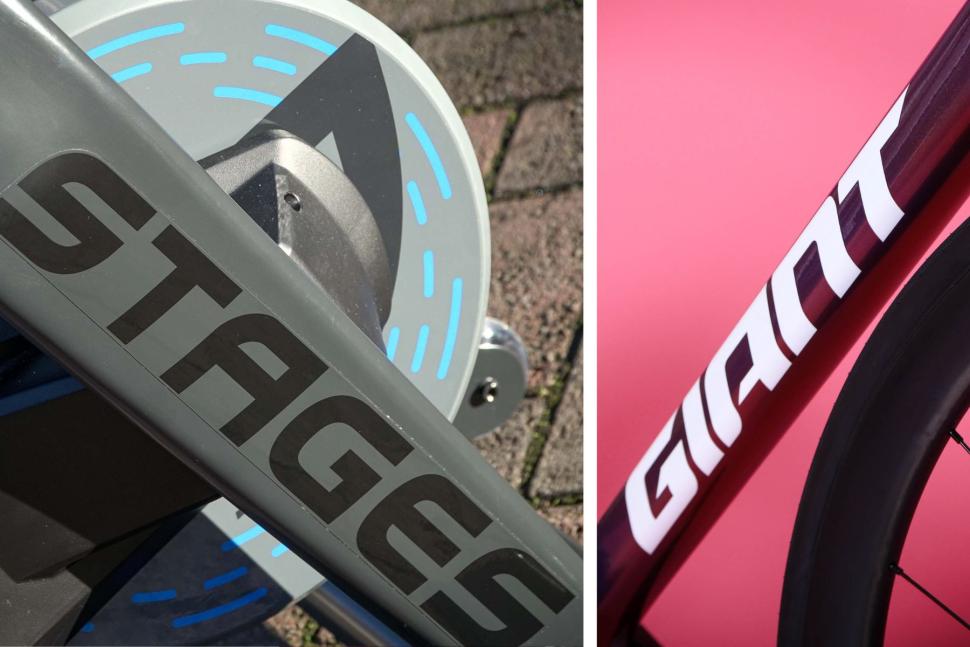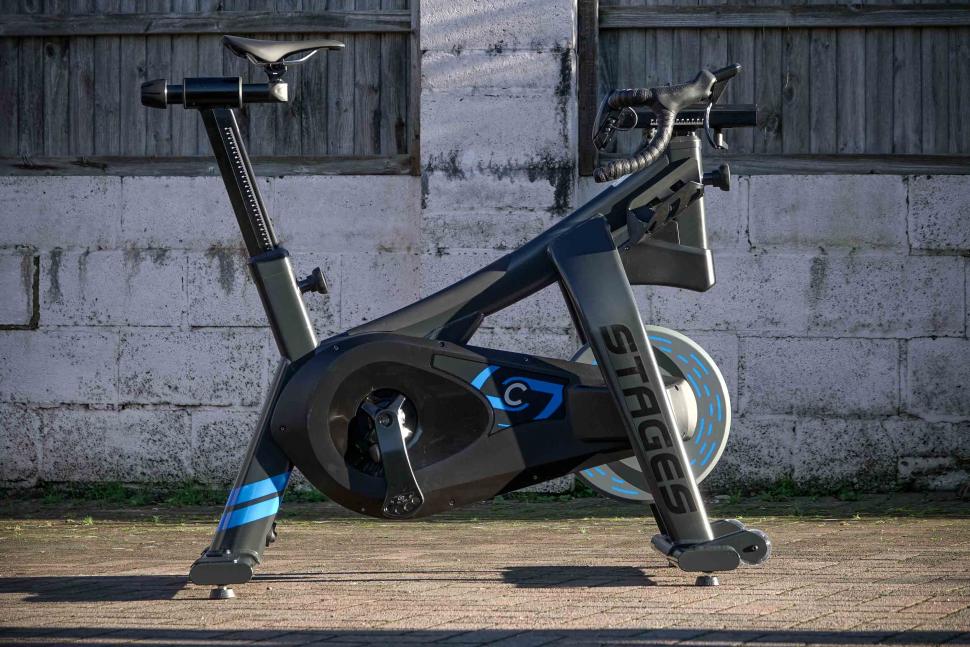- News
- Reviews
- Bikes
- Accessories
- Accessories - misc
- Computer mounts
- Bags
- Bar ends
- Bike bags & cases
- Bottle cages
- Bottles
- Cameras
- Car racks
- Child seats
- Computers
- Glasses
- GPS units
- Helmets
- Lights - front
- Lights - rear
- Lights - sets
- Locks
- Mirrors
- Mudguards
- Racks
- Pumps & CO2 inflators
- Puncture kits
- Reflectives
- Smart watches
- Stands and racks
- Trailers
- Clothing
- Components
- Bar tape & grips
- Bottom brackets
- Brake & gear cables
- Brake & STI levers
- Brake pads & spares
- Brakes
- Cassettes & freewheels
- Chains
- Chainsets & chainrings
- Derailleurs - front
- Derailleurs - rear
- Forks
- Gear levers & shifters
- Groupsets
- Handlebars & extensions
- Headsets
- Hubs
- Inner tubes
- Pedals
- Quick releases & skewers
- Saddles
- Seatposts
- Stems
- Wheels
- Tyres
- Health, fitness and nutrition
- Tools and workshop
- Miscellaneous
- Buyers Guides
- Features
- Forum
- Recommends
- Podcast
news
 2022 Stages indoor bike trainer, 2024 Giant TCR Advanced Pro 1
2022 Stages indoor bike trainer, 2024 Giant TCR Advanced Pro 1Giant acquires Stages Cycling brand and assets, months after suing power meter and indoor bike company for £16 million
Five months after suing Stages Cycling for £16 million worth of unpaid invoices and already manufactured products, and recruiting four of its top executives, Giant has today announced that it has acquired the US-based power meter and indoor bike company’s brand and assets, a move the Taiwanese manufacturer says will “enhance” its indoor and outdoor cycling capabilities, while helping propel Stages’ “fantastic” brand into the future.
In April, it was first reported that Stages – perhaps best known for its power meters, which helped move that particular corner of the cycling market in a more budget-friendly direction when they were introduced in 2012 – had ceased operations and laid off all of its staff, as UK consumers were reassured that warranty claims would be covered by its distributor Saddleback.
Stages initially stopped supplying orders to suppliers and then ceased shipping to customers, the brand’s website showing most products as being unavailable at the time, although various models were still in stock at Saddleback.
Later that same week it emerged that AIPS (Advanced Intelligent Perpetual Solutions), a Giant subsidiary established in 2020 to develop and manufacture cycling technology including power meters, had filed a lawsuit against Stages in Oregon in February, alleging that the US-based company owed over £11 million from 161 unpaid invoices between June 2022 and January 2024, attributed to power meters, exercise bikes, other products and parts, and storage and shipping fees.
The complaint said that Giant also produced and is storing products that Stages ordered, valued at another £5.4 million.
At the same time, at least four high-ranking executives at Stages confirmed that they were moving to Giant, including Pat Warner, Stages’ former senior vice president of product research, who joined Giant as vice president of product research and design, and Paddy Murray, who is now Giant’s VP of global sales and marketing after serving in a similar capacity at Stages.
Then in July, another Giant subsidiary, Spia Cycling, made an initial stalking horse bid for Stages worth $20 million following the brand’s demise. Giant, in fact, had already shown interest in purchasing a one-third share in the ill-fated company last year, although negotiations fell through.
The company’s stalking horse bid for Stages meant that any rivals to Spia’s bid would have to place a minimum $21.5 million competing bid, as well as stump up for a $500,000 minimum overbid charge and a break-up fee, with the deadline for offers set for 1 August.
And on Thursday, former Stages executive Murray confirmed Spia Cycling has successfully acquired Stages’ brand and assets, a move Giant’s global sales and marketing executive says will “propel this fantastic brand into the future with the resource and support of the world's largest bike manufacturer”.
According to Giant, Spia purchased the key assets of the Stages Cycling brand from its parent companies, some of which filed for Chapter 11 bankruptcy protection in June (which allows the debtor to reorganise their business in order to pay creditors over time), including the brand’s intellectual property, manufacturing facilities, product lines, and limited inventory.
> Giant bids to buy assets of bankrupt power meter brand Stages for $20 million
“We are thrilled to integrate Stages Cycling’s assets into our organisation,” Spia’s president Donald Yu said in a statement announcing the Giant subsidiary’s expansion into the commercial fitness sector and plans to “swiftly integrate” Spia’s assets into its operations.
“This acquisition aligns with our strategic goals and enhances our capabilities in both indoor and outdoor cycling. We are committed to leveraging these assets to drive innovation and deliver greater value to our customers and stakeholders.”
Giant also noted that the acquisition supports the manufacturer’s desire to create what it calls a “comprehensive indoor/outdoor cycling ecosystem”, enhance its cycling data capabilities, and enter the commercial fitness market, in which it has been manufacturing products for other brands for three decades.
“We’re thrilled about the opportunities this acquisition presents and the benefits it will bring to Stages Cycling’s dedicated customers,” Murray added.
“Our priority is to ensure a seamless transition while revitalising the Stages brand to address both current and future customer needs. This acquisition underscores the Giant Group’s ongoing commitment to growth and strategic expansion.”
Last month, Giant reported that its pre-tax profits slumped by 17 per cent during the first half of 2024, with sales down by 13 per cent – though the Taiwanese manufacturer nevertheless insisted that it expects its financial situation to “gradually” improve towards the end of 2024 as inventory issues that have plagued the bike industry in Europe and North America begin to normalise.
After obtaining a PhD, lecturing, and hosting a history podcast at Queen’s University Belfast, Ryan joined road.cc in December 2021 and since then has kept the site’s readers and listeners informed and enthralled (well at least occasionally) on news, the live blog, and the road.cc Podcast. After boarding a wrong bus at the world championships and ruining a good pair of jeans at the cyclocross, he now serves as road.cc’s senior news writer. Before his foray into cycling journalism, he wallowed in the equally pitiless world of academia, where he wrote a book about Victorian politics and droned on about cycling and bikes to classes of bored students (while taking every chance he could get to talk about cycling in print or on the radio). He can be found riding his bike very slowly around the narrow, scenic country lanes of Co. Down.
Latest Comments
- Blackthorne 40 min 32 sec ago
I disagree, the lucky few who get to wear one of these will certainly produce more mass.
- Dnnnnnn 1 hour 14 min ago
That wasn't what my original post was about - it was about the NHS as it is now. If you're going to be run over by an ambulance tomorrow, there are...
- imajez 1 hour 39 min ago
I prefer the not haveing to faff with brakes in first place, which is the typical reality for hydraulic systems.
- Backladder 4 hours 43 min ago
I'm sure the met are merely waiting for it to build up to a critical mass and then they'll swoop in and confiscate and crush them all then there...
- qwerty360 6 hours 35 min ago
Reality - I expect most first year lectures have more than 80 students at them; So 80 bicycle spaces is a rounding error on potential demand....
- whosatthewheel 8 hours 14 min ago
Especially that it is a traffic light controlled junction so he must have been completely blinded not to see the red on his left hand side and a...
- biking59boomer 8 hours 45 min ago
Send the details to UK network rail and Transport for Wales as well!
- KDee 9 hours 34 min ago
So that Pulsium from Lapierre has a 415mm wheelbase? I assume it's on 20 inch wheels then!
- ktache 10 hours 30 min ago
It's been one hell of a ride Cav, thanks for letting us share some of it. https://www.theguardian.com/sport/2024/nov/09/mark-cavendish-final-race-...



Add new comment
2 comments
Shouldnt this say - after forcing Stages into bankruptcy, waiting 9 months for the products to die, Giant has bought the remaining distressed assets for a song?
Maybe thats not actually happened and Stages has been on the verge of collapse for years but it all seems a bit murky....
I dont see how any of the products can continue tbh...
Nobody "forced" Stages into bankruptcy. They bankrupted themselves. Giant are not villains for expecting payment for services and products provided. Nor are they villains for withholding ordered products from a customer who seemed unlikely to ever be able to catch up on late payments. When Giant filed the lawsuit in February of 2024, there were unpaid invoices from Stages dating as far back as June 2022. Stages alone are responsible for their financial malpeformance.
After Giant put in their $20million bid for the assets, the rest of the world had ample opportunity to offer more. If $20million was such a "song," surely somebody would have offered $22million (the minimum next bid) or more. Nobody did.